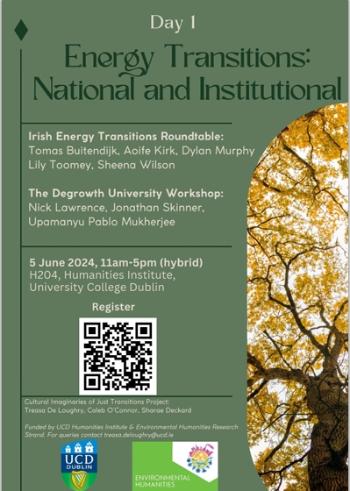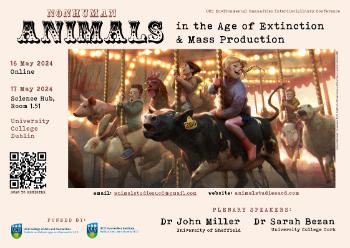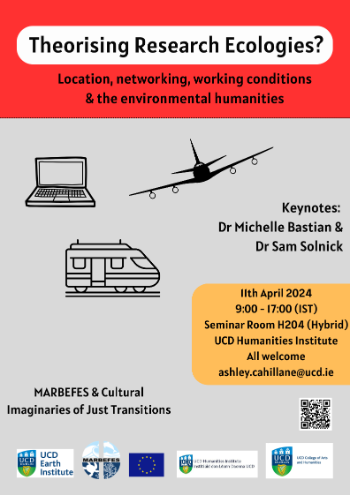
Cultural Imaginaries of Just Transitions: Fostering Interdisciplinary Discussion on Research and Teaching of Contemporary Ecological Challenge
PIs: (opens in a new window)Dr Treasa De Loughry, (opens in a new window)Dr Sharae Deckard
This project puts the frameworks of 'just transitions'—that is, equitable energy and socio-economic transitions from fossil fuels to renewables—into dialogue with the critical and literary insights of humanities scholars. Through a series of workshops we will examine how cultural production mediates the desires and community formations generated by fossil fuel reliant societies, and how new representational forms can reframe how we imagine and participate in a world of climate emergency, with consequences for teaching and research at UCD.
Literary studies and the environmental humanities have been profoundly impacted by the headway made by the “energy humanities”—a field which, in the context of urgent concerns regarding the climate emergency, has pioneered new ways of thinking about the fuels and infrastructures that power our “real” world and fictional universes. However, less well-theorised is the role that culture – fiction, poetry, film, visual art – can play in just transitions. Discussions of just transitions, that is, equitable energy and socio-economic transitions from fossil fuels to renewables, focus largely on technical and regulatory questions (McCauley and Heffron 2018, Wang and Lo 2021). But just transitions must also involve the critical and literary insights of humanities scholars into the ways culture has mediated the desires, affects and community formations generated by fossil fuel reliant societies, such as popular representations of the “freedom” associated with open roads (Mitchell 2011, LeMenager 2014, Szeman et al 2016). The point of this critical-literary questioning is to unpick what cultural imaginaries or narrative apparatuses might aid in generating a sustainable and just post-fossil fuel society, particularly with the advent of renewables and the impact of climate change. Any future energy transition must necessitate transforming the whole of “nature-society” through new cultural forms that reframe how we perceive collective ways of organising and participating in a world of radically-altered socio-ecological relations. Starting in 2023 this project will examine these issues through a series of workshops focused on emerging cultural trends related to just transitions; the cross-disciplinary teaching of major environmental issues at UCD; and a series of outputs including a web presence, podcasts, and academic publications.
If you are interested in knowing more please get in touch with project lead, Dr Treasa De Loughry ((opens in a new window)treasa.deloughry@ucd.ie); or the Director of the Environmental Humanities Thematic Strand, Dr Sharae Deckard ((opens in a new window)sharae.deckard@ucd.ie).
Events:
Cultural Imaginaries of Just Transitions | Energy Transitions: Culture, Pedagogy, Degrowth| Workshop & Symposium
Wednesday, 5th June & Thursday, 6th June 2024 | HI Seminar Room H204
- DAY 1: Energy Transitions: National and Institutional - Irish Energy Transitions: A Roundtable & The Degrowth University: A Workshop | Register on (opens in a new window)EVENTBRITE DAY 1
- DAY 2: Cultures of Energy Transition: A Symposium | Register on (opens in a new window)EVENTBRITE DAY 2
DAY 1 | 5th June | Energy Transitions: National and Institutional
Time: 11am-5pm
Irish Energy Transitions - A Roundtable: The roundtable will briefly give an overview of the major frictions, historical legacies, and promised future outcomes of energy transitions in Ireland.
The Degrowth University: A Workshop:The workshop, curated by colleagues affiliated with Warwick University’s (UK) Critical Environments research cluster, is an invitation to model ways of degrowing the research university. Participants will work together to produce degrowth syllabi and curricula, write degrowth job descriptions, imagine degrowth governance and administration, model degrowth recruitment and admissions policies, and sketch out degrowth research agendas.
DAY 2 | 6th June | Cultures of Energy Transition: A Symposium
Time: 9am-5.30pm-350x497.jpeg)
The symposium will examine how creative and critical works, and global historical case studies, from sites as varied as Canada, Ireland, Japan, Russia, the UK, US, and Western Sahara, offer us ways into interrogating the desires, affects and community formations generated by carbon-based societies, while imagining alternative nature-society relations. Papers will examine cultural responses to the utopian promises and contested enclosures emerging from the transition to renewable energy, including analyses of historical energy transitions as vehicles for liberatory anti-colonial narratives of resource sovereignty; contemporary cultural resistance to top-down energy infrastructural development; and the role of speculative utopian imaginaries in narrating anticipated energy futures.
Speakers include keynotes Sheena Wilson (University of Alberta) and Rhys Williams (University of Glasgow), and poets Jonathan Skinner (University of Warwick) and Lucy Burnett (Lancaster University).
See further event details here:
(opens in a new window)Energy Transitions: Culture, Pedagogy, Degrowth
'Nonhuman Animals in the Age of Extinction and Mass Production' Conference
Friday, 17th May 2024 | Science Hub, Room 1.51
The conference will critically examine the paradoxical situation of nonhuman animal life in the age of mass extinction and mass production. The conference theme addresses one of the most urgent challenges facing humanity and other animals in the context of the climate crisis and the global capitalist system: the destruction of habitats and exploitation of animals that drives both extinction and consumption. It will explore how literature and other cultural productions criticise and rethink the ethical, ecological and social implications of this scenario, fostering a dialogue between Animal Studies and Environmental Humanities, two interdisciplinary fields that share concerns but also have tensions and are rarely in direct conversation with each other. 
Keynote speakers: (opens in a new window)Dr Sarah Bezan(University College Cork) and (opens in a new window)Dr John Miller(University of Sheffield)
Conference website: (opens in a new window)Animal Studies
For further information, please contact: (opens in a new window)animalstudiesucd@gmail.com
Funding support for this event is provided by the UCD Humanities Institute and the UCD College of Arts & Humanities.
Theorising Research Ecologies? An Environmental Humanities Symposium
Thursday, 11th April 2024 | HI Seminar Room H204 + online
How can the environmental humanities expand to consider ‘research environment’ as a form of environment? How do factors such as location, networking, and working conditions matter to the environmental critic? Through a day of discussions, presentations, and provocations, this event advances the environmental humanities in new place-based and politically engaged directions.
environment? How do factors such as location, networking, and working conditions matter to the environmental critic? Through a day of discussions, presentations, and provocations, this event advances the environmental humanities in new place-based and politically engaged directions.
Keynote Speakers: Dr Michelle Bastian and Dr Sam Solnick
Includes a showing of the film essay Making Dust (Arts Council of Ireland, Aemi, 2023) about the demolition of Ireland's second largest Catholic Church, the Church of the Annunciation in Finglas West, Dublin.
A collaboration between MARBEFES (Ashley Cahillane) and Cultural Imaginaries of Just Transitions (Treasa De Loughry). Funded by the UCD Humanities Institute, the UCD Earth Institute, and the UCD College of Arts and Humanities.
Email (opens in a new window)ashley.cahillane@ucd.ie for more details.
Sustainable Transitions and Pedagogy: a coffee morning
Co-organised by Treasa De Loughry and Aparajita Banerjee
Project PIs:
Grant PI:
(opens in a new window)Dr Treasa De Loughry (UCD School of English, Drama and Film)
(opens in a new window)treasa.deloughry@ucd.ie
Environmental Humanities Director of Strand:
(opens in a new window)Dr Sharae Deckard (UCD School of English, Drama and Film)
(opens in a new window)sharae.deckard@ucd.ie
Image credit: CC by Conall
